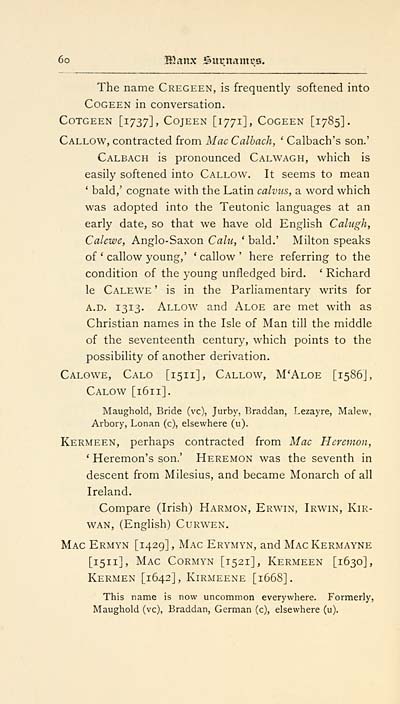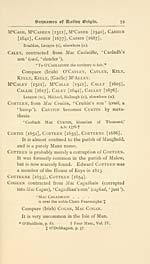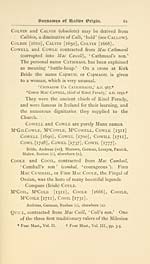Download files
Complete book:
Individual page:
Thumbnail gallery: Grid view | List view

6o 195 anx Sutjttanti?s.
The name Cregeen, is frequently softened into
CoGEEN in conversation.
COTGEEN [1737], COJEEN [1771], COGEEN [1785] .
Callow, contracted from Mac Calbach, ' Calbach's son.'
Calbach is pronounced Calwagh, which is
easily softened into Callow. It seems to mean
* bald,' cognate with the Latin calviis, a word which
was adopted into the Teutonic languages at an
early date, so that we have old English Calugh,
Calcwe, Anglo-Saxon Caki, ' bald.' Milton speaks
of ' callow young,' ' callow ' here referring to the
condition of the young unfledged bird. ' Richard
le Calewe ' is in the Parliamentary writs for
A.D. 1313. Allow and Aloe are met with as
Christian names in the Isle of Man till the middle
of the seventeenth century, which points to the
possibility of another derivation.
Calowe, Calo [1511], Callow, M'Aloe [1586],
Calow [1611].
Maughold, Bride (vc), Jurby, Braddan, Lezayre, Malew,
Arbory, Lonan (c), elsewhere (u).
Kermeen, perhaps contracted from Mac Hcremoii,
' Heremon's son.' Heremon was the seventh in
descent from Milesius, and became Monarch of all
Ireland.
Compare (Irish) Harmon, Erwin, Irwin, Kir-
wan, (English) Curwen.
Mac Ermyn [1429] , Mac Erymyn, and MacKermayne
[1511], Mac Cormyn [1521], Kermeen [1630],
Kermen [1642], Kirmeene [1668].
This name is now uncommon everywhere. Formerly,
Maughold (vc), Braddan, German (c), elsewhere (u).
The name Cregeen, is frequently softened into
CoGEEN in conversation.
COTGEEN [1737], COJEEN [1771], COGEEN [1785] .
Callow, contracted from Mac Calbach, ' Calbach's son.'
Calbach is pronounced Calwagh, which is
easily softened into Callow. It seems to mean
* bald,' cognate with the Latin calviis, a word which
was adopted into the Teutonic languages at an
early date, so that we have old English Calugh,
Calcwe, Anglo-Saxon Caki, ' bald.' Milton speaks
of ' callow young,' ' callow ' here referring to the
condition of the young unfledged bird. ' Richard
le Calewe ' is in the Parliamentary writs for
A.D. 1313. Allow and Aloe are met with as
Christian names in the Isle of Man till the middle
of the seventeenth century, which points to the
possibility of another derivation.
Calowe, Calo [1511], Callow, M'Aloe [1586],
Calow [1611].
Maughold, Bride (vc), Jurby, Braddan, Lezayre, Malew,
Arbory, Lonan (c), elsewhere (u).
Kermeen, perhaps contracted from Mac Hcremoii,
' Heremon's son.' Heremon was the seventh in
descent from Milesius, and became Monarch of all
Ireland.
Compare (Irish) Harmon, Erwin, Irwin, Kir-
wan, (English) Curwen.
Mac Ermyn [1429] , Mac Erymyn, and MacKermayne
[1511], Mac Cormyn [1521], Kermeen [1630],
Kermen [1642], Kirmeene [1668].
This name is now uncommon everywhere. Formerly,
Maughold (vc), Braddan, German (c), elsewhere (u).
Set display mode to: Large image | Transcription
Images and transcriptions on this page, including medium image downloads, may be used under the Creative Commons Attribution 4.0 International Licence unless otherwise stated. ![]()
| Early Gaelic Book Collections > Blair Collection > Surnames & place-names of the Isle of Man > (78) |
|---|
| Permanent URL | https://digital.nls.uk/82100584 |
|---|
| Description | A selection of books from a collection of more than 500 titles, mostly on religious and literary topics. Also includes some material dealing with other Celtic languages and societies. Collection created towards the end of the 19th century by Lady Evelyn Stewart Murray. |
|---|
| Description | Selected items from five 'Special and Named Printed Collections'. Includes books in Gaelic and other Celtic languages, works about the Gaels, their languages, literature, culture and history. |
|---|

